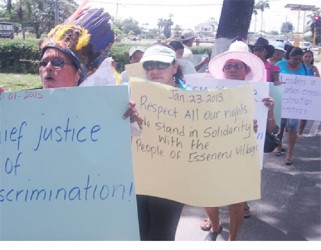The United Nations Committee on the Elimination of Racial Discrimination (UNCERD) has expressed concern over mining on titled land in the Amerindian communities of Isseneru and Kako and has asked government to provide information on the cases as well as to review the granting of permits and concessions without obtaining the prior and informed consent of the affected indigenous communities.
UNCERD considered the situation of the two Region Seven (Cuyuni/Mazaruni) communities during its 82nd Session recently, following information received from non-governmental organizations, the Amerindian People’s Association and the Forest Peoples Programme. A High Court decision in January sparked protests by Isseneru villagers as well as indigenous groups and some Amerindian leaders after the ruling upheld a miner’s right to continue with operations on titled lands within Isseneru. In the case of Kako, the court issued an order restraining the village council from preventing the passage of a water dredge and other mining equipment across the Kako River, which residents had done as they feared pollution of the pristine river.
Attorney-General Anil Nandlall has said that government is not considering an amendment to the Amerindian Act at this stage as this would be premature since the parties involved have indicated an intention to appeal the decision. Kako villagers continue to oppose any mining upriver as the Kako River is their only source of water for drinking and other domestic use as well as fishing.
UNCERD earlier this month expressed concern. “As a result of information received, the Committee is concerned that the government, through the Amerindian Act 2006, has denied the Kako and Isseneru indigenous communities any decision-making rights concerning the mining of lands over which those communities have title,” said chair of the committee Alexei Avtonomov, in a letter to Guyana’s permanent representative to the UN, George Talbot.

“The committee requests the state party to provide information on how the right to free and prior informed consent of the Isseneru and Kako communities is implemented prior to the grant of new mining concessions related to land over which the communities hold title. The committee also requests that the state party review, where relevant, the practice of granting mining permits and concessions without obtaining the prior and informed consent of the affected indigenous communities,” Avtonomov wrote.
He also said the committee has received information suggesting that the High Court of Guyana has in several recent cases applied the Amerindian Act 2006 and in doing so upheld the interests of miners while denying the right of the Isseneru and Kako indigenous peoples to prevent mining on their titled land.
The UNCERD chairman added that the committee has been made aware of three specific cases. He said that in August 2008, the High Court reportedly ruled in favour of Lalta Narine, who requested an injunction against Isseneru so that he could mine the lands over which the community held title. “The court held that the community had no authority over mining under a concession that commenced prior to the community obtaining title pursuant to the 2006 Amerindian Act. The court also enjoined the community from interfering with the miner’s operations,” Avtonomov noted. The community reportedly appealed against the decision in October 2008 but to date no ruling has been made on the matter by the Guyana Court of Appeal, he also noted.
He said that in the second instance, on September 20, 2012, the High Court ruled in favour of Belina Charlie, who had requested access to mine on Kako’s traditional lands. Avtonomov noted that the court issued an order restraining the Kako Village Council from preventing the passage of a water dredge and other mining equipment across the Kako River.
In the third instance, he said, the High Court on January 17, 2013, reportedly ruled in favour of Joan Chang, who had requested an injunction to mine on the titled lands of Isseneru. “The court held that the miners had obtained mining permits prior to the entry into force of the Amerindian Act 2006 and consequently did not have to obtain permission from the community before carrying out mining operations on titled lands,” the UNCERD chair observed.
“The committee expresses its concern about the limits of the legislation which has allowed mining activities carried out by non-indigenous parties to take place on indigenous traditional territories including indigenous titled lands without the free and prior informed consent of the affected communities and in non-compliance with the convention and international standards, including its General Recommendation No 23 on the rights of indigenous peoples,” said Avtonomov.
He said the committee would like to recall paragraphs 17 and 19 of its concluding observations adopted on April 4, 2006 following the consideration of the periodic report of Guyana. “The committee would also like to reiterate paragraph 15 of its concluding observations in which it recommended the amendment of the Amerindian Act to remove any discriminatory distinctions in the legislation,” Avtonomov said.
The committee also requests Guyana to provide information on steps taken to implement the paragraphs mentioned as well as updated information on the results of the October 2008 appeal of Isseneru.
The UNCERD chair said that in accordance with article 9(1) of the convention and article 65 of its Rules of Procedure, the committee would be grateful to receive information on all the issues and concerns outlined, before July 31, 2013. He also urged Guyana to submit its 15th and 16th periodic reports which were overdue since March 17, 2008.









